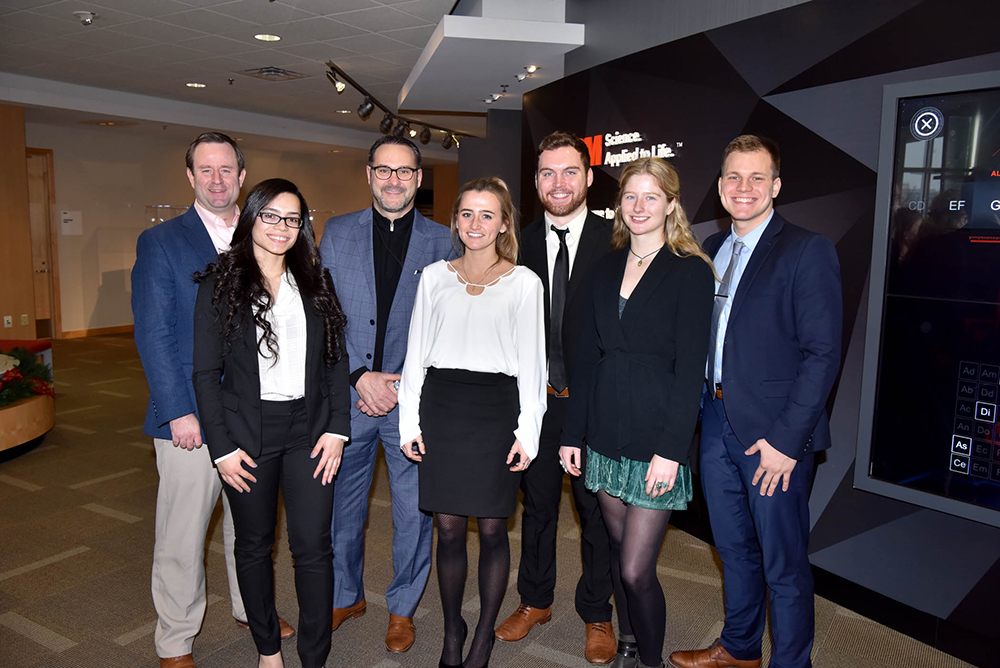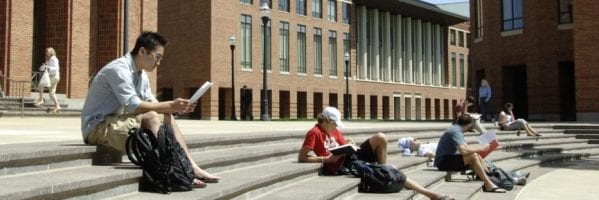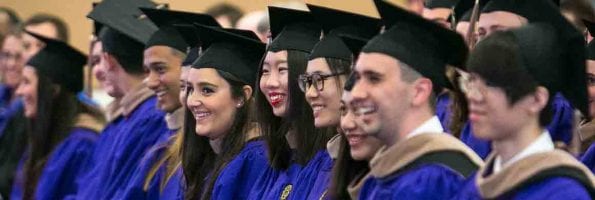Handling the Customer Employee Relationship, According to Northwestern – Chicago News

Let’s explore some of the most interesting stories that have emerged from Chicago business schools this week.
Customers Can Be Jerks. Here’s Why Some Employees Retaliate – Kellogg Insight
Northwestern University Kellogg School of Management Clinical Professor of Management and Organizations Cynthia Wang co-authored new research that seeks to understand the broader implications of employee reactions to unpleasant customers. Do they respond in turn with hostility and try to sabotage the customer or do they turn the other cheek?
Among the extensive psychological research in this area, Wang and her co-authors were drawn to a model known as the social intuitionist model, which argues that moral-decision making is the result of snap judgement and heightened emotion.
“In that heightened emotional state,” Wang explains, “we begin to view problem customers as not worthy of fair treatment—a phenomenon psychologists call ‘devaluation of targets’—which leads employees to see those customers as subhuman.” The reverse, where customers also treat employees poorly, also rang true.
Wang adds:
“These decisions are very quick and implicit. We don’t necessarily notice them going on.”
You can read more about the research here.
Brexit Clouded by Uncertainty, Says Gies Professor – Gies School of Business News
United Kingdom Prime Minister Theresa May canceled the House of Commons Brexit vote that was scheduled for December 11, putting a Brexit solution on hold for now, leaving the future of UK’s relationship with the European Union up in the air.
The UK is still scheduled to leave the EU on March 29, 2019 and parliament needs to strike a deal to make the departure as smooth as possible. Major challenges include finding a solution for the border between Northern Ireland and the Republic of Ireland, along with dealing with the consequences of leaving the European Union for businesses and jobs in both the United States and the UK.
Candace Martinez, University of Illinois Gies College of Business Clinical Assistant Professor of Business Administration, remarks, “If the UK cannot arrive at a solution to the Irish border quandary, a ‘backstop’ approach is a last resort,” noting that Northern Ireland voted to remain in the EU on the June 2016 referendum.
Martinez adds, “Uncertainties are everywhere. This is uncharted waters, to be sure.”
You can read more from the interview with Martinez here.
Sales Class Challenges Students to Provide Creative Solutions for Nonprofits – DePaul Business News & Events
As part of the Marketing 386: Social Impact Sales course at the DePaul University Driehaus College of Business Center for Sales Leadership, students are partnered with a local nonprofit, providing marketing and sales advice. “After working in teams, students present their business plans to the nonprofit toward the end of the quarter. A winning team is then selected by Drehmer and the non-profit to present their creative solutions in front of executives at 3M in St. Paul, Minn.,” according to DePaul University’s Jaclyn Lansbery.

(Left to right) Center for Sales Leadership Executive-in-Residence Charlie Drehmer; Isaly Varela; Mark McLellan, national channel operations manager at 3M; Dominique DiVito; Gavin Hultgren; Ava Kilborn and Mike Nowak / Photo via business.depaul.edu
Charles Drehmer (BS `03, MBA `04, MA `16, Ph.D. `17), who teaches the course, says: “The Social Impact Sales class is extremely rewarding for both me and the students in that we truly make difference in people’s lives. The class is as real as it gets, where students meet with the client to discover their needs and wants, design and execute a market research study and then present their recommendations to the client. Not only does the project provide students a hands-on real-world experience, they also get to make a positive impact on underserved communities.”
Last fall, students worked with Chicago Community ToolBank, providing a marketing and sales strategy. “The project focused on a new program, Corporate Days of Service, which offers private companies a unique team-bonding experience where they use the ToolBank’s tools and facilities to build furniture that is donated to a nonprofit organization of their choice. Students also worked together to build bookshelves that were donated so they better understood what new service would entail,” Lansbery writes.
Isaly Varela, an undergraduate business student in the program, adds, “The class has given us the skills to think critically about marketing and sales along with being comfortable with ourselves.
To read more about the program, head on over to the official DePaul Univesity website.
How Woman Can Close the Pay Raise Negotiation Gap, and More – Chicago News

Let’s explore some of the most interesting stories that have emerged from Chicago business schools this week.
Are You Willing to Stretch the Truth While Negotiating? – Kellogg Insight
Research trends have found that men are more willing to lower personal ethical standards during negotiations than women when it comes to pay raise negotiation.
However, a new study from Northwestern University Kellogg School of Management‘s Maryam Kouchaki, Assistant Professor of Management and Organizations, finds that there’s a situation that throws a wrench in the works: “when women negotiate on behalf of others.”
Kouchaki and her UC Berkeley co-author Laura Kray write:
“A woman who is negotiating on behalf of someone else will lie at roughly the same rate as her male counterpart. But, if she is negotiating on her own behalf, she is much less likely to deceive. Women in advocacy roles [get] as much done as men.”
You can read more about Kouchaki’s pay raise negotiation research here.
Will EU Migrants Pay Their Fair Share of Taxes? – Chicago Booth News
The Chicago Booth Initiative on Global Markets surveyed its European Economic Experts Panel, which is comprised of “50 economists and top researchers,” about whether recent European migrants are likely to “contribute more in taxes paid than they receive in benefits and public services.”
LSE’s Daniel Sturm writes, “Being younger and typically better educated, their [the migrants’] fiscal contribution tends to be positive as suggested by recent research for the U.K.”
Goethe University Frankfurt’s Jan Pieter Krahnen agrees:
“As [the] employment rate among migrants goes up over time, and much of taxation is indirect anyway, chances are that the statement comes true.”
Director of the European IGM Panel Christian Leuz is less optimistic. “[It is] too early to tell. Labor market outcomes are often worse for [a] long time. Demographics are [a] plus. Much depends on fast integration into [the] labor market.”
You can read more from the panel’s discussion here.
Faculty and Students Team Up with Northern Illinois Food Bank – Quinlan School of Business News
Loyola University Quinlan School of Business’ Urban Social Benefit Incubator teamed up with the Northern Illinois Food Bank to develop a “new system for serving its families” to replace the precarious first-come, first-served process it currently employs.
Quinlan is proposing “an online ordering system that allows for pick-up at strategic locations in the community, such as a grocery store.”
Harry Haney, Associate Director of Quinlan’s Supply and Value Chain Center, who is helping spearhead the initiative, writes:
“It’s important to us to serve nonprofits and social enterprises to help make a difference in the community. Plus, our students are learning the real-world side of business and gaining additional educational exposure.”
You can read more about Loyola’s food bank initiative here.
Ohio State Remodels the Fisher Full-Time MBA Program

Just as 2018 draws to an eventful close, the Max M. Fisher College of Business at Ohio State University has announced a major remodeling of the Ohio State MBA.
The New Ohio State MBA
According to a new release from the school, the new Ohio State MBA “takes advantage of Fisher’s strong relationships with employers and recruiters to cultivate career competencies sought by organizations.”
Flexibility and tailoring the curriculum directly to student needs is the primary emphasis of the newer MBA model:
“Students will undergo an assessment at the beginning of their MBA experience to identify their strengths and skills gaps. Their program builds on these strengths to close the gaps so they earn an MBA that fits and distinguishes them in the marketplace.”
This MBA curriculum also “incorporates immersive, cross-functional projects with top companies and organizations locally and globally.” These changes include a Global Applied Projects to enhance international experience and exposure, a Business Lab Project to get hands-on experience with major local companies, and a Core Capstone Experience at the conclusion of the program.

Fisher College of Business Dean and John W. Berry, Sr. Chair in Business, Anil K. Makhija, says, “Continuous innovation is a priority which is explicitly highlighted in the college’s strategic plan. This innovation guides our approach to how all of our programs are delivered.”
Fisher’s full-time MBA Co-Director Roger Bailey, when discussing the new changes, says, “The data-driven approach to this redesign has yielded a full-time MBA program that is able to maximize the potential of each student. We are excited about how these many changes leverage Fisher’s strengths, and the increased value it will provide to our students, our alumni and the greater business community.”
News of the school’s changes to the full-time MBA come just one year after it adjusted its highly-regarded Working Professionals MBA; its part-time format counterpart. In 2017, Ohio State added a weekend option to the program, which previously only featured a weekday evening schedule.
The new Ohio State full-time MBA also arrives just 12 months after Fisher introduced its 10-month Specialized Master in Business Analytics program.
For more information on the recently revitalized Ohio State MBA and its other programs, head over to the official school website.
From Disney to Starbucks, and More – Chicago News

Let’s explore some of the most interesting stories that have emerged from Chicago business schools this week.
Don’t Let Complacency Derail Your Career – Kellogg Insights
Carter Cast, the Northwestern Kellogg Clinical Professor of Innovation and Entrepreneurship and author of “The Right (and Wrong) Stuff: How Brilliant Careers Are Made — and Unmade,” writes about how “Version 1.0” employees who “lack curiosity and avoid taking risks” may find themselves professionally derailed.
“You have to find ways to stay fresh, especially in this day and age with the massive rate of change in technology. Disruption is everywhere.”
-
- Following a promotion, understand your supervisor’s expectations. “Ask the boss: ‘With this new job, what will I have done in two years to make you think that this was a good move to promote me? What are the key success metrics I should be aiming for?’”
- Increase your learning agility, or how quickly you develop and apply new skills by honing a discovery mindset. “[Force] yourself to acquire new skills that could help you down the road. If you work in sales, for example, you might take time to understand how the marketing team leverages its social marketing assets.”
- Identify your particular “area of innate resistance,” which Cast believes can stifle career growth if not addressed. He advises to spend more time being open to what you could learn than spending time and energy on what you already know.
- Cast advises Version 1.0 types to “adopt the ‘lean thinking’ mentality in order to refresh their thinking and test new ideas.”
- Networks that individuals can “rely on for information and assistance” are critical when jobs are constantly in flux. According to the article, “A strong, diverse network can help you bounce back after a challenge or shake-up.”
You can read more from the article here.
From Disney to Starbucks, Shewalter Doesn’t Shy Away From Big Challenges – Gies College of Business News
The U. Illinois Gies College of Business recently profiled Erik Shewalter (BADM ’14) who offers insights from his transition from Disney’s DTC streaming service to product management role at the Starbucks Rewards Innovation Team where he oversees strategy and innovation.
Shewalter spoke at length about a defining moment from his “once-in-a-lifetime” opportunity at the Disney-branded streaming service where he realized how much he loved the work he was doing.
“One of the defining moments of my career will forever be one of my first meetings with Kevin Mayer (Chairman of Direct-to-Consumer and International). I came to the meeting prepared, and because I was so immersed in the data, I was able to share specific insights that influenced decisions like the choice to include Star Wars and Marvel content in the streaming service.”
One major reason Shewalter left Disney for Starbucks was to work alongside his fiancée Naomi Liu (FIN, BADM ’15) who works in food innovation.
“There are so many little perks that materialize every day, such as sharing a commute, or even sharing our networks (which is critical for succeeding at Starbucks). Also, we love to surprise each other by bringing the other person drinks and snacks throughout the day.”
Check out the entire Gies College of Business News interview here.
Rogers Park and Edgewater Businesses Becoming More Sustainable with Loyola’s Help – Quinlan School of Business
With the support of Loyola University’s Quinlan School of Business Experiential Learning Communities in Solidarity program, professor Nancy Landrum orchestrated partnerships with Smack Dab Chicago and Edge of Sweetness Bakery for her Sustainable Business Management class.
Teams from Landrum’s class “performed waste, water, and simple energy audits and completed greenhouse gas inventories” and then organized “cash mob” events to attract customers to the businesses.
According to the article, “Edge of Sweetness saw a 216 [percent] increase in sales during the cash mob, and Smack Dab Chicago saw a 51 [percent] increase.”
Edge of Sweetness co-owner Kate Merrill (BSN ’96) writes, “I was delighted and surprised by how thorough they were during the initial evaluation. They were also very proactive about what they wanted to do with the projects, which was very nice to see.”
Smack Dab Chicago co-founder Axel Erkenswick adds, “I was interested to see how in-depth the students went into their audits, including going through our waste. Energy conservation is important to me, because it shows customers that we are more than a McDonald’s. We are community driven and put our efforts into helping the environment.”
Read more about the Quinlan program here.
Americans Are Disconnected With Upward Mobility, Says New Kellogg Research – Chicago News

Let’s explore some of the most interesting stories that have emerged from Chicago business schools this week.
How Closely Do Our Beliefs About Social Mobility Match Reality? – Kellogg Insight
New research from Northwestern Kellogg Assistant Professor of Managerial Economics and Decision Sciences Edoardo Teso assessed mobility rates among social classes in the U.S., U.K., France, Italy, and Sweden and found that Americans’ overestimated and Europeans underestimated “people’s chances of climbing from the bottom to the top of the economic ladder.”
According to the article, Teso wonders whether the disconnect between people’s perceptions compared to the reality of social mobility might “explain why the United States often resists income redistribution policies such as higher taxes for the wealthy, while many European nations embrace them.”
“These perceptions are really deeply rooted,” Teso notes.
“America is famously a land of immigrants where many people did in fact build their own fortunes. In contrast, Europe practiced feudalism for centuries, during which a person’s fate was largely governed by their family circumstances,” Teso’s research claims.
You can read more about research here.
PIMCO and University of Chicago’s Center for Decision Research Announce Partnership to Guide Wiser Decision-Mking – Booth School of Business News
To commemorate the partnership between Chicago Booth’s Center for Decision Research (CDR) and PIMCO, an “innovator in applying research to investment decisions,” the CDR laboratories will be rechristened the PIMCO Laboratories for Decision Research, which will “yield scientific discoveries with the potential to improve individual and social welfare.”
PIMCO Group CIO Dan Ivascyn writes, “Through this novel partnership, we hope to nurture exceptional insights into decision making behavior that will ultimately help PIMCO make wiser decisions for portfolios, clients and employees.”
Booth Dean and George Pratt Shultz Professor of Accounting Madhav Rajan writes, “PIMCO’s spirit of experimentation and interest in asking real-time questions about investing and the economy make it the ideal partner for Booth.”
According to the press release, the PIMCO Decision Research Laboratories will “include a new ‘storefront’ behavioral science research lab to foster greater engagement with the public and to broaden the reach and increase diversity of participants in the research studies.”
Rajan continues, “From PIMCO’s plans to disseminate CDR’s research findings, to conducting joint projects in behavioral science, the collaboration will have a transformational impact on our research enterprise.”
You can read more about the partnership here.
MBA Student Carley Mostar Secures Funding for Her Community – UIC Business Blog

Carley Mostar, Gies MBA ’19
The UIC Liautaud Graduate School of Business recently profiled Carley Mostar, MBA ’19, whose “Info Park” project secured $25,000 in funding from the Ford College Community Challenge (Ford C3).
Conceived as a collaboration between Mostar, the UIC School of Architecture, and the community of East Garfield Park, Mostar dreamt a plan to transform “one of the lots into a member-use space for the community to use as our own public or private space.”
Mostar and the group have hit the ground running, working with “community engagement workshops and have even started researching fabricators and vendors to work with in preparation for construction, slated to start in early spring of 2019.”
Mostar explains the importance of incorporating the voices of the community into her “Info Park” plan.
“It’s very important to me when doing this kind of work to make sure that the people who the work is for have their voices centered in the outcome of the project,” she says in a recent interview.
You can read more about Mostar and the project here.
Tech Interests and West Coast Jobs Spike in New Northwestern Kellogg Employment Report

Last week, Northwestern University’s Kellogg School of Management released its 2018 Employment Report revealing a record number of graduates going into the tech industry (28 percent) and more companies hiring Kellogg talent than ever before. Other highlights include a growing number of graduates headed to the West Coast for jobs (around one-third) and a steady employment rate with 94.6 percent of students receiving a job offer three months post-graduation—a slight increase from 94.1 percent last year.

Kellogg Job Offers and Salaries Remain Stable
Over the last two years, Northwestern Kellogg has witnessed strong and steady base salaries and job offers with little to no change. Although the number of MBA graduates heading into consulting decreased slightly this year (down to 30.1 percent from 32.9 percent), the median salary was $147,000 for both years. The technology industry had similar results though interest increased year-over-year (24.9 percent in 2017 compared to 28.3 percent in 2018). Median base salaries in technology stayed consistent with just a slight increase from $125,000 in 2017 to $130,000 in 2018.
As for graduates seeking employment, in both 2017 and 2018, around 82 percent of MBA students were looking for a job. Of those students, 94.1 percent received an job offer last year compared to 94.6 percent this year.
“We are thrilled to see the continued strong demand for Kellogg talent across a diverse range of industries and geographies,” Kellogg admissions says.
Kellogg Students Head to the West Coast & Work at a Range of Companies
One of the most notable differences this year was the number of MBA graduates heading to the West Coast. Thirty-three percent of students took a job in the West, the highest percentage ever. That change correlated to a decrease in interest in the Midwest down to 26.1 percent from 30.2 percent. However, more students took an international job compared to last year (12.8 percent in 2018 compared to 10.9 percent in 2017).
Another stand out in this year’s employment report was the growing breadth of companies hiring Kellogg talent. Last year, 207 companies were responsible for employing all 500-odd students. This year, 228 companies hired MBA graduates, “illustrating that Kellogg equips its graduates for jobs anywhere,” Kellogg admissions wrote.
As for the top companies hiring graduates, that prestige went to The Boston Consulting Group and McKinsey & Company, both of which hired 33 grads. Other top employers included Bain & Company (24), Amazon (21), and Deloitte Consulting LLP (12).
